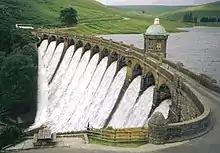Craig Goch Dam
The Craig Goch Dam, often called the Top dam, is a masonry dam in the Elan Valley of Wales and creates the upper-most of the Elan Valley Reservoirs. Construction on the dam began in 1897, and it was completed in 1904. The primary purpose of the dam and the other reservoirs is to supply Birmingham with water.[1][2] In 1997, a 480 kW hydroelectric generator began operation at the dam.[3][4]
| Craig Goch Dam | |
|---|---|
 | |
 Location of dam in Wales | |
| Coordinates | 52°18′17″N 03°37′26″W |
| Construction began | 1897 |
| Opening date | 1904 |
| Dam and spillways | |
| Height | 120 ft (37 m) |
| Length | 390 ft (119 m) |
| Width (base) | 104 ft (32 m) |
| Dam volume | 80,000 cu yd (61,164 m3) |
| Reservoir | |
| Creates | Craig Goch Reservoir |
| Total capacity | 6,137 acre⋅ft (7,569,878 m3) |
| Surface area | 217 acres (1 km2) |
| Power Station | |
| Commission date | 1997 |
| Turbines | 1 x Francis-type |
| Installed capacity | 480 kW |
Potential river transfer scheme
The Craig Goch reservoir had been identified in the 1970s and in the 1990s as a potential source of water for the south-east of England.[5] The latest project envisaged raising the existing dam, adding a secondary dam at the head of the River Ystwyth valley and piping water from the high head generated into the River Severn and subsequently transferring it by pipeline aqueduct to the head-waters of the River Thames in the Cotswolds.[5]
Media appearances
Craig Goch Dam was featured prominently in Episode 3 Series 3 of BBC Wales drama series Hinterland, broadcast 2017.
References
- "CRAIG GOCH DAM, ELAN VALLEY WATER SCHEME". Royal Commission. Retrieved 17 March 2011.
- "The Elan Valley dams - Craig Goch dam". Powys Digital History Project. Retrieved 17 March 2011.
- "Dams & Reservoirs". Elan Valley. Archived from the original on 24 March 2011. Retrieved 19 March 2011.
- "Elan Valley Hydro Scheme". University of Strathclyde. Archived from the original on 23 March 2018. Retrieved 19 March 2011.
- "Thames scheme threatens river life". New Scientist. 3 August 1996. Retrieved 3 September 2020.

